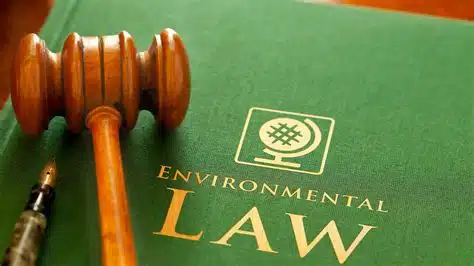What is an Environmental Lawyer?
An environmental lawyer is a legal professional who specializes in dealing with legal issues related to the environment. They are responsible for protecting the environment and representing clients in environmental matters. Environmental lawyers work to ensure that businesses and individuals comply with environmental laws and regulations. They may work for government agencies, non-profit organizations, or private law firms.
To become an environmental lawyer, there are certain educational requirements that must be met. Aspiring environmental lawyers must first obtain a bachelor’s degree. While there is no specific major required, it is beneficial to study fields such as environmental science, biology, or political science, as these topics are closely related to environmental law. After completing a bachelor’s degree, individuals must attend law school and obtain a Juris Doctor (J.D.) degree. During law school, it is highly recommended to take courses in environmental law and participate in environmental law clinics or internships.
Along with the necessary educational background, skills and qualities play a crucial role in the success of an environmental lawyer. Strong analytical and research skills are essential, as environmental law often involves complex legal issues. Attention to detail is also important to ensure accuracy in legal documents and contracts. Environmental lawyers must possess excellent communication skills, as they need to effectively convey legal information to clients, judges, and opposing counsel. Additionally, a passion for environmental protection and a deep understanding of environmental issues are qualities that set environmental lawyers apart in their field.
Environmental lawyers can have a wide range of areas of practice. They may specialize in areas such as air and water quality, land use and zoning, wildlife protection, or hazardous waste management. Some environmental lawyers focus on litigation, representing clients in environmental lawsuits. Others may work on regulatory compliance, helping businesses navigate environmental regulations and avoid legal troubles. There are also environmental lawyers who engage in environmental advocacy, lobbying for policy changes and participating in public interest litigation to protect the environment.
The role of environmental lawyers extends beyond legal representation. They actively participate in the development of legislation and policies related to the environment. Environmental lawyers work closely with lawmakers and government agencies to draft and implement environmental laws and regulations. They may contribute their expertise in drafting environmental impact assessments or in negotiating settlements between parties involved in environmental disputes. Environmental lawyers also provide guidance and advice to clients on how to minimize their environmental footprint and ensure sustainable practices.
Educational Requirements for Environmental Lawyers
Environmental lawyers play a crucial role in advocating for and protecting the environment. They are legal professionals who specialize in environmental law and work to ensure that environmental regulations are upheld and followed. To become an environmental lawyer, there are specific educational requirements that must be met.
Undergraduate Education
Before pursuing a career in environmental law, aspiring lawyers must first complete their undergraduate education. While there is no specific major required, it is recommended to choose a field of study that provides a strong foundation in critical thinking, research, and writing skills. Many students opt to major in fields such as environmental science, biology, chemistry, or political science. These fields can provide a solid understanding of environmental issues and policies, which will be beneficial when transitioning to law school.
Law School
After completing their undergraduate education, students must attend law school to earn a Juris Doctor (J.D.) degree. Law school typically requires three years of full-time study. Admission to law school is competitive, and candidates must submit applications, which may include their undergraduate transcripts, letters of recommendation, and a personal statement. Once admitted, law students study various areas of law, including constitutional law, contracts, torts, and environmental law.
Environmental Law Specialization
While in law school, students interested in becoming environmental lawyers can choose to specialize in environmental law. Specializing in this field allows them to gain in-depth knowledge of environmental regulations, policies, and litigation strategies. They may take specific courses such as environmental law, natural resources law, climate change law, and administrative law. Some law schools also offer clinics or externship opportunities where students can gain practical experience in environmental law cases.
Bar Examination and Licensure
After graduating from law school, individuals must pass the bar examination in the state or jurisdiction where they wish to practice law. The bar exam is a comprehensive test that assesses the candidate’s knowledge of legal principles and ethics. Upon passing the bar exam, individuals are licensed to practice law in that particular jurisdiction. Environmental lawyers may also choose to obtain additional certifications or memberships in professional organizations to further enhance their credentials and demonstrate their commitment to the field.
In conclusion, becoming an environmental lawyer requires a solid educational foundation. Aspiring lawyers must complete their undergraduate education, attend law school, specialize in environmental law, and pass the bar examination. These educational requirements, along with the necessary skills and qualities, will pave the way towards a fulfilling career in environmental law.
Skills and Qualities of Environmental Lawyers
Environmental law is a complex and rapidly evolving field that requires individuals with a unique set of skills and qualities to navigate its intricacies. Being an environmental lawyer goes beyond simply being well-versed in legal matters; it entails a deep understanding and passion for the environment, as well as the ability to advocate and make a difference.
One of the primary skills that environmental lawyers must possess is analytical thinking. They need to be able to assess complex environmental issues, identify potential legal implications, and develop effective strategies for their clients. This requires a keen attention to detail and the ability to think critically to come up with innovative solutions.
Another crucial quality of an environmental lawyer is excellent communication skills. Environmental lawyers often need to communicate complex legal concepts to individuals who may not have a legal background. They must be able to articulate their arguments clearly, both in written documents and in verbal presentations. Effective communication is key to persuading judges, policymakers, and the public to support environmentally friendly practices and policies.
In addition to analytical thinking and communication skills, environmental lawyers must also possess a strong passion for the environment. They are motivated by a desire to protect and preserve the natural world and are committed to advocating for sustainable practices. This passion drives their dedication and perseverance in pursuing environmental justice.
Furthermore, environmental lawyers must have a strong research and investigative mindset. They need to stay updated on current environmental laws, regulations, and scientific advancements to effectively represent their clients. This requires conducting thorough research, gathering evidence, and analyzing complex data. Keeping up with the latest developments in environmental science and policy is essential to building a strong case.
Other skills and qualities that environmental lawyers may possess include negotiation skills, problem-solving abilities, and an understanding of international laws and treaties. They may also need to be familiar with environmental science and policy, as well as have the ability to work well within interdisciplinary teams.
In conclusion, being an environmental lawyer requires a combination of skills, qualities, and a deep passion for the environment. From analytical thinking and communication skills to a commitment to environmental justice, environmental lawyers are instrumental in advocating for sustainable practices and protecting our planet.
Areas of Practice for Environmental Lawyers
An environmental lawyer is a legal professional who specializes in environmental law and regulations. They play a crucial role in ensuring that individuals, businesses, and government agencies comply with environmental laws and regulations.
Environmental lawyers have a wide range of areas in which they can practice. Some of the main areas of practice for environmental lawyers include:
- Natural Resource Management: Environmental lawyers can specialize in managing natural resources such as land, water, minerals, and wildlife. They work to ensure sustainable and responsible use of these resources, balancing the needs of both human development and environmental protection. Environmental lawyers can help clients obtain permits and licenses for resource extraction and exploitation while also advising on the legal implications of natural resource management.
- Land Use and Development: Environmental lawyers can assist clients in navigating the complex legal requirements and regulations related to land use and development. They work with developers, landowners, and government agencies to ensure that land use projects comply with environmental laws, zoning regulations, and permits. Environmental lawyers can help in preparing and reviewing environmental impact assessments, negotiating with regulatory agencies, and representing clients in legal disputes related to land use.
- Pollution Control and Remediation: Environmental lawyers also play a crucial role in addressing and mitigating pollution issues. They advise clients on compliance with air and water pollution laws, hazardous waste management, and cleanup procedures. Environmental lawyers can assist in negotiating with regulatory agencies and representing clients in environmental litigation, seeking compensation for damages caused by pollution, or defending against claims of environmental harm.
Summary of Areas of Practice for Environmental Lawyers
| Area of Practice | Description |
|---|---|
| Natural Resource Management | Specializing in sustainable use and management of natural resources. |
| Land Use and Development | Navigating legal requirements and regulations for land development projects. |
| Pollution Control and Remediation | Addressing pollution issues and advising on compliance with pollution laws. |
Role of Environmental Lawyers in Legislation and Policy
In today’s rapidly changing world, the environment is facing numerous challenges. From climate change to deforestation, it is evident that sustainable development is more important than ever. This is where environmental lawyers play a vital role in shaping legislation and policy to protect our planet. Environmental lawyers specialize in legal matters related to the environment and work tirelessly to ensure that laws and policies are in place to safeguard nature and promote sustainable practices.
One of the primary roles of environmental lawyers is to advocate for environmental protection through legislation and policy. They work closely with government agencies, non-profit organizations, and other stakeholders to develop and enforce laws that address environmental concerns. These lawyers are responsible for drafting and reviewing environmental legislation, conducting legal research, and representing clients in environmental cases.
Moreover, environmental lawyers also play a crucial role in enforcing environmental regulations. They monitor the implementation of laws and policies and take legal action against individuals or organizations that violate environmental regulations. Through their expertise in environmental law, they ensure that polluters are held accountable and that the environment is protected for future generations.
- Environmental lawyers have a wide range of responsibilities, including:
- Advising clients on environmental laws and regulations
- Participating in negotiations and settlements
- Conducting environmental impact assessments
- Providing legal representation in court
- Collaborating with scientists and policymakers
Given the complexity of environmental issues, environmental lawyers must possess a diverse set of skills and qualities. They need to have a solid understanding of environmental science and policy, as well as strong analytical and problem-solving skills. Environmental lawyers must also have excellent communication skills, as they need to effectively convey legal concepts to clients and stakeholders. Additionally, a passion for environmental protection and a commitment to upholding the principles of sustainability are essential traits for a successful career as an environmental lawyer.
| Areas of Practice for Environmental Lawyers | Examples |
|---|---|
| Climate Change Law | Developing strategies to mitigate the impacts of climate change |
| Land Use and Conservation Law | Protecting natural habitats and ensuring responsible land use practices |
| Water and Air Pollution Law | Advocating for clean water and air standards and addressing pollution issues |
| Renewable Energy Law | Promoting the development and use of renewable energy sources |
In conclusion, environmental lawyers have a crucial role to play in shaping legislation and policy to protect the environment. Through their expertise and dedication, they ensure that the laws and regulations in place promote sustainable practices and hold those who harm the environment accountable. By collaborating with various stakeholders and advocating for change, environmental lawyers contribute significantly to the fight for a greener and more sustainable future.
Frequently Asked Questions
Example Question What is an Environmental Lawyer?
An environmental lawyer is a legal professional who specializes in environmental law. They provide legal guidance and representation in matters related to environmental issues, such as pollution, natural resource management, climate change, and conservation.
Example Question What are the educational requirements for Environmental Lawyers?
To become an environmental lawyer, one must first complete a bachelor’s degree, preferably in a related field such as environmental science, biology, or ecology. Afterward, they need to attend a law school and obtain a Juris Doctor (J.D.) degree. Additionally, obtaining a Master of Laws (LL.M) degree in environmental law is beneficial for further specialization in the field.
Example Question What skills and qualities are important for Environmental Lawyers?
Environmental lawyers should possess strong analytical, research, and problem-solving skills. They need to have a solid understanding of environmental regulations and policies. Additionally, good communication, negotiation, and advocacy skills are essential for effectively representing their clients’ interests.
Example Question What areas of practice do Environmental Lawyers focus on?
Environmental lawyers can work in various areas, including litigation, compliance and enforcement, land use planning, renewable energy, corporate sustainability, and policy development. They may represent individuals, organizations, or government agencies in both private and public sectors.
Example Question What is the role of Environmental Lawyers in legislation and policy?
Environmental lawyers play a crucial role in the development and implementation of legislation and policies related to environmental protection. They work closely with lawmakers and policymakers to draft, review, and analyze environmental laws and regulations. They also provide legal advice and representation to clients in matters concerning environmental policy advocacy.
Example Question What is the importance of Environmental Lawyers in society?
Environmental lawyers are vital in ensuring the protection of the environment and natural resources. They help enforce environmental laws and regulations, work towards sustainable practices, and fight against practices that harm the environment. Their work contributes to the overall well-being of society and the preservation of the planet for future generations.
Example Question How can I become an Environmental Lawyer?
To become an environmental lawyer, you can start by pursuing a bachelor’s degree in a related field and then applying to law school. It is also beneficial to gain experience through internships, volunteer work, or joining environmental organizations. Networking with professionals in the field and staying updated on environmental issues and policies are also valuable steps towards a career as an environmental lawyer.






